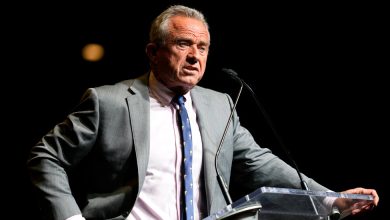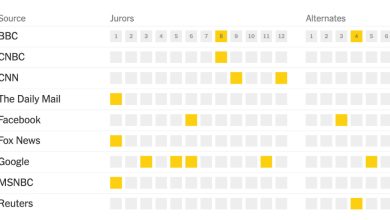Richard C. Wald, Leader in Print and Network News, Dies at 92

Richard C. Wald, who in a long adventure in journalism was the last managing editor of The New York Herald Tribune, ran NBC News in the 1970s and helped turn ABC News into a powerhouse, died on Friday in New Rochelle, N.Y. He was 92.
His son Matthew said the cause was complications of a stroke.
When Mr. Wald joined ABC News as a senior vice president in 1978, it was being remade by its ambitious president, Roone Arledge, who had built his reputation in sports. Mr. Wald and Mr. Arledge, classmates at Columbia College, built up the division, with Mr. Wald as chief overseer of the network’s news programming, including its centerpiece, “World News Tonight.”
“Dick was the perfect No. 2 for Roone because he had great news values and a great feel for events,” the reporter Carl Bernstein, who was briefly the ABC News bureau chief in Washington and later a correspondent for the division in the 1980s, said in a phone interview.
Mr. Wald, who was known as Dick, and Mr. Arledge lured the anchor David Brinkley from NBC News, where he was unhappy, to host what would become the hit Sunday morning program “This Week With David Brinkley.” Mr. Wald vetted stories to make sure they met the news division’s standards.
Mr. Aldredge said Mr. Wald elevated ABC News’s stature and its journalistic credibility. “He became a key collaborator, particularly when it came to the innards of our business — the news desk, the news bureaus, overseas,” Mr. Arledge wrote in “Roone: A Memoir” (2003).
Mr. Wald also gave the network’s celebrated late-night news program “Nightline” its name.
At the time, it was called “America Held Hostage,” a nightly report about the hostage crisis in Iran, where Americans had been seized by Islamic fundamentalists after a takeover of the U.S. Embassy. But the plan was to reboot it going forward into a more wide-ranging news program.
Ted Koppel, the program’s former host, recalled a meeting with Mr. Arledge, Mr. Wald and David Burke, Mr. Arledge’s other top lieutenant, at which they tossed out new names for program.
“Dick said, ‘You know something, in horse racing they’ve got this thing called the morning line. Why don’t we call it “Nightline”?’” Mr. Koppel said in a phone interview. “And the three of us said that’s a really terrible idea, and Dick said, ‘I haven’t heard anything better.’”
In the 1990s, Mr. Wald took on the role of ethics czar at ABC News, reviewing segments and programs before they aired to ensure that the network did not broadcast flawed stories.
“In my position,” Mr. Wald once told The Christian Science Monitor “you get all of the blame when things go wrong and none of the praise when things go right.”
In one instance, when Barbara Walters interviewed Dr. Jack Kevorkian in 1993, Mr. Wald stepped in to advise against letting her use a video of Dr. Kevorkian helping a patient commit suicide.
Mr. Wald left ABC News in 1999 to teach national affairs reporting and critical issues in journalism at the Columbia University Graduate School of Journalism.
Richard Charles Wald was born on March 19, 1930, in Manhattan. His father, Joseph, an Austrian immigrant, owned a garment factory. His mother, Lily (Forstate) Wald, was a homemaker.
After earning a bachelor’s degree in English literature at Columbia in 1952, Mr. Wald spent two years studying English on a fellowship at Clare College at the University of Cambridge and received a master’s degree.
Soon after that, he joined The Herald Tribune, for which he had freelanced in college. Over the next dozen years he was a reporter, foreign correspondent (in Europe and Africa), executive editor of national news and associate editor, before being named managing editor — the No. 2 job under the top editor, James Bellows — in early 1966.
As an editor he worked with Jimmy Breslin and Tom Wolfe, two of the star Herald Tribune writers who helped define the New Journalism. But Mr. Wald was managing editor for only six months before the newspaper folded.
In a parting gesture, Mr. Wald handed the paper’s Sunday supplement to its founder, Clay Felker, who revamped it as the glossy stand-alone New York magazine.
“He said to Jock Whitney, ‘Let Clay take the magazine,’” Mr. Wald’s son Jonathan said in a phone interview, referring to the newspaper’s publisher, John Hay Whitney.
Mr. Wald hung on to a vestige of the shuttered newspaper by serving as the Sunday editor of The New York World Journal Tribune, a short-lived merger of the carcasses of three of the city’s papers: The Herald Tribune, Journal-American and World-Telegram and Sun.
He then moved on to The Washington Post, where he was named an assistant managing editor. But he left not long afterward, when he recognized that he would not rise higher as long as Ben Bradlee was managing editor.
He was named a vice president of NBC News in 1968 and became president five years later. At NBC he notably moved Tom Brokaw from White House correspondent to host of the “Today” show in 1976 and hired Jane Pauley as the co-host a year later. He also set up a special unit to produce long-form reports for “NBC Nightly News.”
In 1974, he spent time with the screenwriter Paddy Chayefsky, who was doing research for a film that would become the scabrous satire “Network.” Mr. Chayefsky watched as Mr. Wald talked to colleagues, taking notes and writing down TV news jargon.
Mr. Chayefsky “was very charming, and he was very funny about some of the people he’d seen,” Mr. Wald told Dave Itzkoff for his book “Mad as Hell: The Making of ‘Network’ and the Fateful Vision of the Angriest Man in Movies” (2014). “Which led me to believe that he was not going to treat them kindly.”
Mr. Wald resigned from NBC News in 1977 after disputes with the network’s upper management over issues like the signing of exclusive and expensive contracts with former President Gerald R. Ford; his wife, Betty; and Henry A. Kissinger, the former secretary of state, to appear on special NBC News broadcasts.
Although he endorsed the signings at the time, he later came to feel that the fees paid had led to cuts in his budget for special news reports and documentaries, The New York Times reported at the time.
After leaving NBC, Mr. Wald consulted with PBS on the future of news-gathering on public television and for three months was a special assistant to Otis Chandler, publisher of The Los Angeles Times.
When Mr. Arledge recruited him to join ABC News in 1978, Mr. Wald had to adjust to the culture there, especially in the Washington bureau, which did not greet him happily.
“If you think we need some guy from NBC to help us, you’re mistaken,” Frank Reynolds, one of three anchors on ABC’s “World News Tonight,” said, according to Mr. Arledge’s memoir.
Mr. Wald adapted and stayed for 21 years.
In addition to his sons Matthew, a former reporter for The New York Times, and Jonathan, a former executive producer of “Today” and “NBC Nightly News,” Mr. Wald, who lived in Larchmont, N.Y., is survived by a daughter, Elizabeth Wald; seven grandchildren; and one great-grandson. His wife, Edith (Leslie) Wald, died in 2021.
While still the president of NBC News, Mr. Wald foresaw the likelihood of an all-news network in 1976, four years before Ted Turner created CNN.
“I would bet that, owing to the technology with which we are faced, within 10 years there will be an all-news television station,” he said in a speech to the National Association of Broadcast Employees and Technicians. “There’s no reason why there shouldn’t be. We could produce that much picture, that much of the time, with not a huge investment.”




